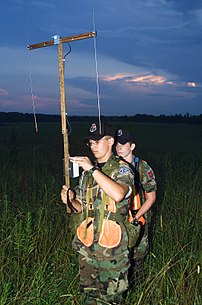This past weekend, I spent my Friday, Saturday, and most of Sunday out in the Blue Hills reservation just south of Boston, MA training the cadets of Boston Cadet Squadron. These young adults are members of Civil Air Patrol, the volunteer organization that I have been a part of for eight years now. Our goal for the weekend was to work as a single team while we trained in Emergency Services, survival, and overnight camping. At least that had been the plan.
I have been instructing these same topics for a number of years now but of late, my lessons have focused on learning through my teaching. Working with cadets that are from ages 12 to 18, I have found it a challenge for me to properly orient my instruction and leadership style to suit the varied needs of the cadets in our squadron. Timing can be ironic - I'm currently a teaching assistant and candidate for Teach for America. This means that I've been working in the "teaching" area for a while now and I am just starting to notice the issues that come along with being a teacher.
There are such varying levels of support needed by our cadets - everything from complete autonomy to complete and total supervision. There are a few that I would trust to be out in the woods for weeks on end but others that I would prefer to have a physical leash to. How does one cope with these situations? How do I change behavior when I don't have the "full" story on cadet conditions, attitudes, and history? Answer: you do your best and work as a team.
In order to make legitimate change with these cadets, I need to alter behavior. Through my experience, I have found this to be a difficult task, though not impossible. The United States Air Force Academy taught me many things about leadership and one of the most powerful tools we experienced was the power of peer accountability. This is the idea that you are responsible for the actions of your teammate, and they are likewise responsible for yours.
We are making changes in the way that we work within the group. I am changing my role within the power structure. We will go back to basics in order to obtain the correct temperment and attitudes. We will remove priveledges such as talking, break times, and "fun" activities if need be. We will provide structured rituals such as current event and news reviews, squaring of corners, and the buddy system. Finally, we will delegate responsibility to the lowest level possible while enabling those levels to make good decisions.
Hopefully, these changes will create the environment necessary for proper learning to take place, for friendships to form, and leadership to flourish. My goal for these kids is for them to develop into leaders with a sense of purpose, drive, and self respect that their peers in inner-city Boston do not have. I want them to be constantly thinking about the group, not just themselves, I want them to work as a team.
If you have suggestions for making this process easier, please email me at james(dot)m(dot)connors(at)gmail(dot)com or leave a comment here for people to share.
[Edit: removed "children" from first paragraph 10.10.08]



